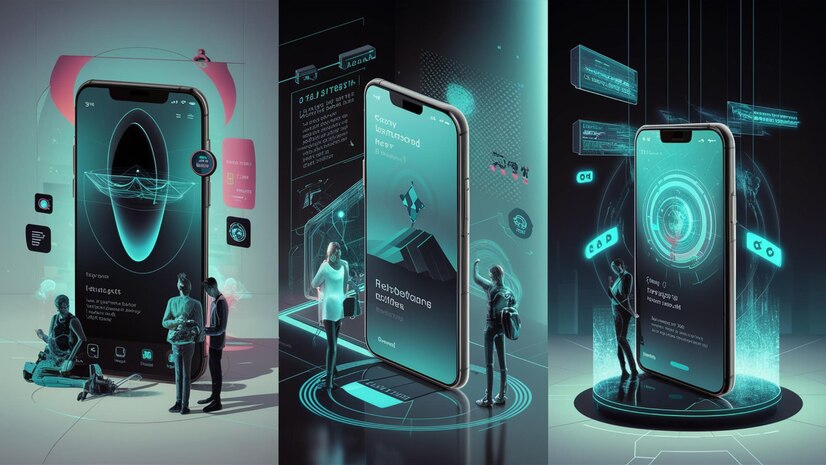Mobile app development is no longer just a buzzword; it’s a critical aspect of our digital lives. As technology advances at an unprecedented pace, the way we develop and interact with mobile apps is also evolving. From groundbreaking innovations to the challenges that lie ahead, this article explores the future of mobile app development, shedding light on the trends and best practices that will shape the industry in the years to come.
The Current Landscape of Mobile App Development
Evolution Over the Years
The mobile app industry has come a long way since its inception. In the early days, apps were simple, often limited to basic functionalities like calculators or games. However, as smartphones became more sophisticated, so did the apps. Today, mobile applications are integral to our daily routines, from social networking to banking, shopping, and even managing health.
Impact of COVID-19 on Mobile App Development
The COVID-19 pandemic further accelerated the growth of the mobile app market. With more people working remotely and relying on digital tools, the demand for mobile apps surged. This period saw a significant increase in the development of apps related to health, education, and e-commerce, highlighting the industry’s ability to adapt to changing needs.
The Growth of the Mobile App Market
The mobile app market continues to expand, with revenues projected to reach new heights in the coming years. As more businesses recognise the potential of mobile apps to engage customers and drive sales, the competition in the app development space is intensifying.
Key Trends Shaping the Future of Mobile App Development
Artificial Intelligence and Machine Learning Integration
Artificial Intelligence (AI) and Machine Learning (ML) are no longer just buzzwords; they’re transforming mobile app development. By integrating AI and ML, developers can create smarter apps that offer personalised experiences, predictive analytics, and automated customer support. Imagine an app that can anticipate your needs before you even realise them—this is the future we’re heading towards.
5G Technology and Its Impact on App Development
The rollout of 5G technology is set to revolutionise the mobile app industry. With faster internet speeds and lower latency, 5G will enable developers to create more complex and responsive apps. Whether it’s high-definition video streaming, real-time gaming, or enhanced AR and VR experiences, 5G will push the boundaries of what’s possible in mobile app development.
The Rise of AR and VR in Mobile Apps
Augmented Reality (AR) and Virtual Reality (VR) are no longer confined to the gaming industry. These technologies are making their way into various sectors, including retail, healthcare, and education. Mobile apps that incorporate AR and VR can offer immersive experiences, such as virtual try-ons or 3D visualisations, which enhance user engagement.
Cross-Platform Development Tools
With users spread across different platforms, cross-platform development is becoming increasingly important. Tools like Flutter and React Native are enabling developers to create apps that work seamlessly on both Android and iOS. This not only reduces development time but also ensures a consistent user experience across devices.
The Growing Importance of App Security
As mobile apps become more integrated into our lives, the need for robust security measures is more critical than ever. With increasing incidents of data breaches and cyberattacks, developers must prioritise app security from the very beginning. Implementing encryption, secure authentication, and regular updates are just a few ways to safeguard user data.
Best Practices for Future Mobile App Development
Prioritising User Experience (UX)
In the competitive world of mobile apps, user experience is paramount. An app that’s difficult to navigate or slow to respond will quickly lose users. To create a positive UX, developers should focus on intuitive design, fast loading times, and seamless navigation.
Personalisation and Customisation
Personalisation is key to enhancing user experience. By leveraging AI, apps can offer personalised content, recommendations, and notifications that resonate with individual users. Allowing users to customise their app experience further increases engagement and satisfaction.
Accessibility Considerations
Accessibility should not be an afterthought in mobile app development. Ensuring that apps are usable by people with disabilities—whether it’s through voice control, screen readers, or adaptable interfaces—broadens the user base and fosters inclusivity.
Agile and DevOps Methodologies
The Agile methodology, combined with DevOps practices, is becoming the standard approach in mobile app development. These methodologies promote collaboration, continuous improvement, and faster time-to-market.
Continuous Integration and Continuous Deployment (CI/CD)
CI/CD practices are vital for maintaining a steady flow of updates and improvements in mobile apps. By automating testing and deployment, developers can quickly identify and resolve issues, ensuring that the app remains up-to-date and functional.
Emphasising Security from the Start
Security should be integrated into the app development process from day one. This includes implementing secure coding practices, conducting regular security audits, and staying updated on the latest security threats.
Leveraging Cloud Technology
Cloud technology offers numerous benefits for mobile app development, including scalability, flexibility, and cost efficiency. By hosting apps on the cloud, developers can easily manage data, integrate third-party services, and ensure smooth performance even during traffic spikes.
Focusing on Performance Optimisation
Performance is a critical factor in the success of a mobile app. Slow load times, crashes, or battery drain can drive users away. Developers should focus on optimising app performance by minimising code bloat, using efficient algorithms, and regularly testing the app across various devices.
The Role of Developers in Shaping the Future
Staying Updated with Emerging Technologies
In an industry that evolves as rapidly as mobile app development, staying updated with the latest technologies is crucial. Developers should continuously learn and adapt to new tools, frameworks, and trends to remain competitive.
Collaborative Development and Open Source Contributions
Collaboration is key to innovation in mobile app development. By contributing to open-source projects, developers can share knowledge, gain new insights, and push the boundaries of what’s possible.
Challenges in Mobile App Development
Keeping Up with Rapid Technological Advancements
The pace of technological change in mobile app development is both exciting and challenging. Developers must constantly update their skills and adapt to new tools and frameworks to stay relevant.
Managing Cross-Platform Compatibility
With the variety of devices and operating systems available, ensuring cross-platform compatibility is a significant challenge. Developers need to ensure that their apps function smoothly on all platforms without compromising on performance or user experience.
Balancing Innovation with User Needs
While innovation is essential, it should not come at the cost of user satisfaction. Developers must strike a balance between introducing new features and maintaining the app’s usability and reliability.
Conclusion
The future of mobile app development is both promising and challenging. With emerging technologies like AI, 5G, and AR/VR, the possibilities are endless. However, developers must also navigate the complexities of cross-platform compatibility, security, and user experience. By staying updated with trends and adhering to best practices, developers can create innovative and successful apps that stand the test of time.
FAQs
What is the most important trend in mobile app development?
Artificial Intelligence (AI) integration is currently one of the most important trends, as it enables apps to offer personalised and predictive experiences that enhance user engagement.
How will 5G technology influence mobile apps?
5G technology will significantly improve app performance by providing faster internet speeds and lower latency, allowing for more complex and responsive applications.
Why is app security becoming more critical?
With the increasing prevalence of cyber threats, app security is essential to protect user data and maintain trust. Developers must prioritise security throughout the app development process.
What are the benefits of cross-platform development?
Cross-platform development allows developers to create apps that work on multiple operating systems, reducing development time and ensuring a consistent user experience across devices.
How can developers stay ahead in the mobile app industry?
To stay ahead, developers should continuously learn about emerging technologies, contribute to open-source projects, and adopt agile and DevOps methodologies for efficient development and deployment.




